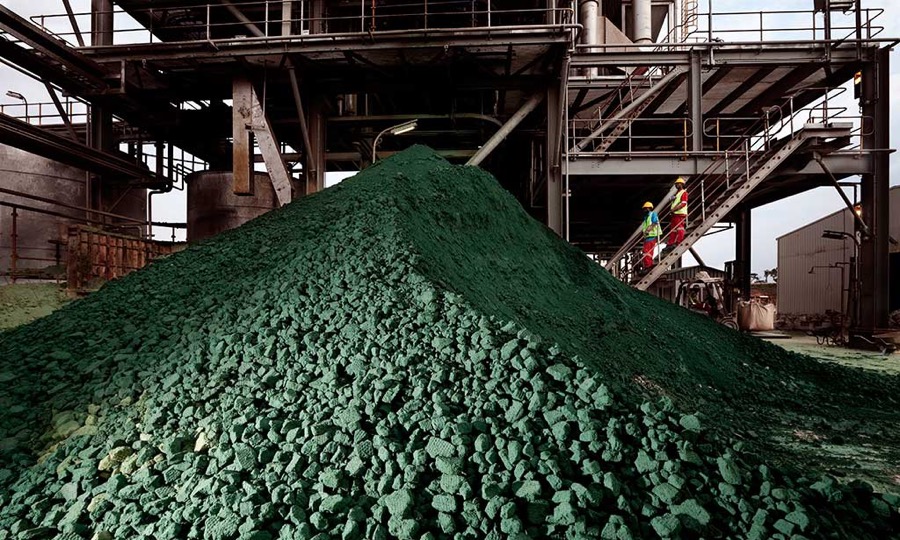
Processing facilities at Tenke Fungurume mine. (Image courtesy of Lundin Mining.)
https://www.mining.com/web/a-1-5-billion-hoard-of-copper-and-cobalt-is-piling-up-in-congo/
A growing pile of copper and cobalt worth about $1.5 billion is stranded in the Democratic Republic of Congo, caught up in a standoff over the future of one of the world’s biggest battery-metal mines.
The huge stash of metal is owned by China’s CMOC Group Ltd, which is locked in a dispute with its Congolese state-owned partner over royalty payments. While its exports were blocked in mid-July, CMOC’s Tenke Fungurume mine has kept running at close to full capacity, simply stockpiling the extra metal until it can resume shipments, according to people familiar with the matter.
The logjam is a stark reminder of the vulnerabilities in electric-vehicle supply chains, which rely heavily on a small clutch of mines in a handful of countries — in the case of cobalt, Congo is by far the largest supplier. Battery metal prices have become increasingly volatile as producers struggle to match output to demand, creating headaches for automakers on the upswings, and miners on the way down. The Tenke Fungurume stockpile raises the threat of more sharp swings to come.
By now, there are about 120,000 tons of copper and around 12,500 tons of cobalt stuck waiting to leave the country, according to people familiar with the matter and Bloomberg calculations. The copper accounts for the bulk of the value, at about $1.1 billion at spot prices, but it only represents about 7% of total global monthly production, and is unlikely to affect international prices when it does hit the market.
For cobalt, however, the implications could be seismic.
Tenke Fungurume accounts for about 15% of global supply — a larger share of production than the 10% slice of global oil output controlled by Saudi Arabia. Surprisingly, the market has managed quite well without Tenke’s cobalt, because demand for use in electronics has fallen and output elsewhere is increasing, sending prices tumbling more than 60% from a peak last year. The eventual release of the CMOC stockpile could drive them much lower still.
At the heart of the issue is state miner Gecamines’ claim that CMOC has been lying about its mineral reserves and owes the company $7.6 billion in royalties and interest. The pair also need to negotiate a sales contract to set the terms for future exports.
Part of the reason that the stockpile has become so large is that CMOC has remained hopeful throughout the dispute that a resolution was close, which kept it from dialing back activity at the site, according to people familiar with the operation.
Yet a deal has so far proven elusive. Every day, roughly 500 tons of copper and 50 tons of cobalt are being added to the stash of metal, creating a growing logistical and commercial headache for CMOC and its partners.
And when the stockpile does eventually start to move, it’s likely to spark a scramble for trucks in the region, driving up freight costs and adding to the chronic logistical logjams at the Congolese border.
CMOC did not reply to an email seeking comment. Gecamines Deputy Chief Executive Officer Leon Mwine Kabiena, who oversees the Tenke mine portfolio for the Lubumbashi-based company, did not immediately provide comment when contacted by Bloomberg on email.
The Tenke stockpile has cast a long shadow over the cobalt market, turning once-firm bulls like top producer Glencore Plc into reluctant pessimists.
Still, CMOC’s role in the market and deep pockets mean it will have little incentive to dump the metal.
The Chinese company has a market capitalization of about $17 billion, and said last year that Contemporary Amperex Technology Co. Ltd. — the world’s largest EV battery-maker — had agreed to buy a 25% stake. It also owns IXM, a major metals trading house.
“CMOC have had the balance sheet to operate the mine and stockpile the material throughout this period, so I don’t think they’ll be under pressure to offload it overnight in a fire sale,” said Caspar Rawles, chief data officer at Benchmark Mineral Intelligence, which estimates the size of the cobalt stockpile at 10,000 to 12,000 tons. “But at some point they will have to sell, and there’s more than enough material around already.”
(By Mark Burton and Michael J. Kavanagh, with assistance from Jack Farchy and Winnie Zhu)
No comments:
Post a Comment